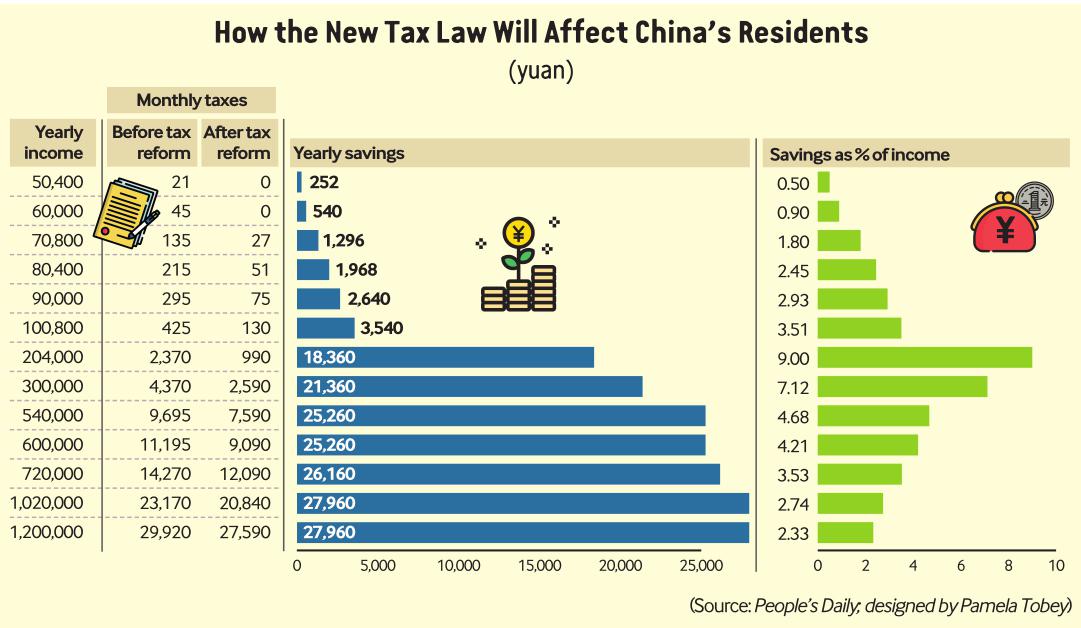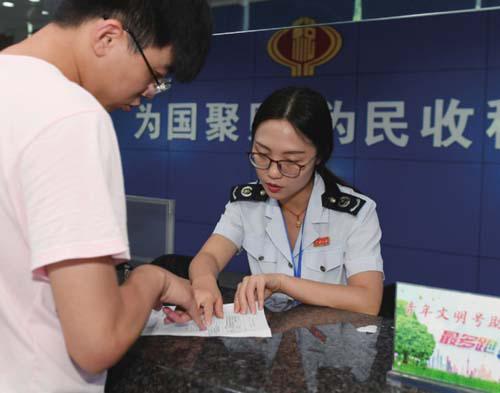Deeper Pockets
By Li Xiaoyang
After sharing a piece of news relating to the raising of the minimum threshold for individual income tax on his social media account, Liu Bo posted that “it gives me courage to live in such a big city.”
Working in a public institution in Beijing and earning around 4,200 yuan ($611) per month, Liu is one of those influenced by the policy. His annual personal income tax expenditure will be reduced to zero once the new amendment takes effect.
On August 31, Chinas top legislature announced an amendment to the Individual Income Tax Law that will see the minimum threshold for personal income tax raised for the fourth time, from 3,500 yuan ($510) to 5,000 yuan ($728) per month. Chinas classified tax system will also take the first step toward integrating comprehensive tax with classifi ed tax.
The new tax law also covers special expense deductions for items such as childrens education, higher education, treatment for serious illnesses, housing loan interest or rent and elderly care, the fi rst time such deductions will be included in Chinas individual income tax system. The new threshold will go into effect on October 1 and the rest of the amendment will take effect on January 1, 2019.
The amendment will mitigate the tax burden on low- and middle-income groups and improve peoples capacity for consumption. “It will stimulate domestic consumption and therefore drive Chinas economic growth,” Cheng Lihua, Vice Minister of Finance, said at a press conference on August 31.
Landmark changes
The 2018 Report on the Work of the Government highlighted the importance of reforming the individual income tax system to reduce the burden on taxpayers. In response to the proposals, the amendment to the Individual Income Tax Law was added to the agenda.
According to Xu Hongcai, Deputy Chief Economist at the China Center for International Economic Exchanges, Chinas tax system should be adjusted to solve the problem of income polarization and achieve a more even distribution of wealth.
“There are more measures the authorities can take on tax reduction to expand domestic demand,” Xu told Beijing Review.
Chinas Individual Income Tax law was fi rst introduced in 1980, with the minimum threshold set at 800 yuan ($537). In the years since, the threshold had been raised three times, in 2006, 2008 and 2011. After seven years, the rise of personal incomes has again made necessary an increase of the income tax threshold, so as to ease the burden on low- and middle-income residents.
According to Cheng, the new threshold was set at 5,000 yuan in accordance with statistics that suggest the average percapita consumption expenditure in Chinese cities and towns is around 4,200 yuan per month in 2018.
The threshold of 5,000 yuan is not fixed and more dynamic adjustments will be made in line with the reform of the individual income tax system and changes to the consumption expenditure of residents in cities and towns. “It will cover per-capita consumption expenditures and give more freedom to consumption growth,” Cheng said.
China has also initiated the reform of the classifi ed tax system. A prominent defect of the original system is that peoples income from different sources is taxed separately under different items, according to Zhang Bin, Director of the Tax Research Office of the National Academy of Economic Strategy, Chinese Academy of Social Sciences (CASS), in an interview with Peoples Daily.
“Under the current system, those with lower salaries but higher total earnings may pay less tax than those who earn the same amount with one job. In the interests of fairness, a new tax system combining comprehensive tax with classifi ed tax would be more appropriate,” said Zhang.
With the changes to be put into practice in less than a month, relevant sectors are faced with various challenges. The administration is moving faster to formulate supporting policies, update information systems, train personnel and optimize resource allocation, said Liu Lijian, chief auditor of the State Administration of Taxation, at the news conference.
Further efforts
Benefits aside, the changes to the tax system have generated concerns over the decline of fiscal revenue. Official data shows that the number of Chinese taxpayers decreased from around 84 million to 24 million in 2011 when the minimum threshold for individual income tax was raised from 2,000 yuan ($291) to 3,500 yuan.
According to Cheng, following the new policy, the proportion of individual income taxpayers among Chinese workers in cities and towns will decrease from 44 percent to 15 percent. After the changes take effect, Chinese fi scal revenue will be cut by about 320 billion yuan ($46.58 billion) a year.
However, it should be noted that the decrease of low- and middle-income taxpayers will be accompanied by an increase in high-income taxpayers.
Wang Jianfan, head of the Department of Taxation of the Ministry of Finance, pointed out that the number of highincome Chinese taxpayers will increase due to economic growth and the improvement of the income distribution system.“Individual income tax will become an even more significant contributor to total tax revenue,” Wang said. According to Wang, China will not see a remarkable decline in its fiscal revenue, with a more appropri- ate tax system where the major taxpayers come from the high-income group.

The amendment is a marker of signifi -cant progress for Chinas tax system, while more efforts are still needed for further improvement. The policy on the deduction of special expenses has posed greater challenges to relevant sectors in terms of developing more sophisticated standards and improving management.
Elderly care is one such example. Yang Zhiyong, a research fellow at the National Academy of Economic Strategy, CASS, pointed out in an interview with 21st Century Business Herald that benefi ciaries of special expense deductions need to be classified in a more detailed way and the criteria for who qualifi es needs to be better defi ned.
The possibility remains that tax reductions aimed at boosting consumption could also lead to an increase in saving, particularly for house purchases.
“Residents in big cities could still be burdened by skyrocketing home prices and rent despite the easing of the tax burden,”said Ye Yongqing, a partner from King & Wood Mallesons.

